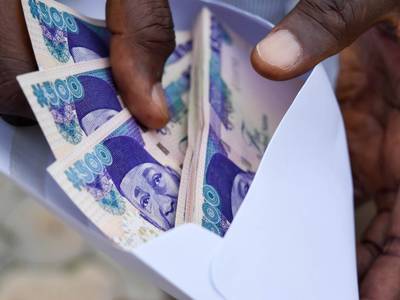Advertisement
Views expressed by contributors are strictly personal and not of TheCable.
Add a comment


OPINION BY FAITH OMONIYI
In recent times, naira has been defined by its continuous downward spiral. The naira has plummeted from $1/N198 to $1/N430 in the parallel market during the last six years. This increase equates to a 209% depreciation. The depreciation is due to a reduction in global oil prices, a lack of foreign currency income, and higher inflation in the country.
The downward trend of the naira is set to continue if proper economic measures are not in place. Increasing Nigeria’s export potential and reducing the inflation rate are viable options for getting naira back on track.
OVERBEARING WEIGHT ON OIL
Low export potential is one of the causes of the naira’s depreciation. According to the National Bureau of Statistics (NBS), in 2021, Nigeria’s imports exceeded exports by N1.94trn. Nigeria’s foreign exchange earnings are derived primarily from the export of petroleum. However, Nigeria still spends $14.95 billion on the import of petroleum products annually. Nigeria needs to build refineries to shelve this figure or collaborate with private companies like Dangote and BUA that are building refineries. These refineries can help to solve 80℅ of the petroleum products import woes.
Once these refineries are constructed, the country can begin to generate its petroleum products and save up on the billions of dollars spent on importing petroleum products. The Dangote refinery needs about $1.1billion for complete construction. The Nigerian government can collaborate by donating a portion of the required money or working out a flexible loan to complete the project.
Furthermore, Nigeria needs to look beyond petroleum as its primary source of foreign income and seek out viable alternatives. Agriculture shows great promise as a bountiful export potential for the country. In 2021, Agriculture contributed 2.67% of Nigeria’s export; an underperformance, given the number of agricultural land areas that Nigeria currently has. Nigeria has a total arable land mass of about 34 million hectares. However, this figure is not fully utilised in agricultural products and export potential.
A more significant percentage of Nigeria’s agricultural products come from the northern region, with substantial dependence on rain-fed cultivation. This kind of cultivation is mainly unpredictable and dependent on the climate. Only 1% of Nigerian cropland is irrigated.
The adoption of small-scale irrigation by farmers can significantly boost agricultural productivity. Cultivating maize, vegetables, and rice using this system can bring up to a $600 million increase in income for farmers during dry seasons. And, in turn, boost Nigeria’s foreign earnings. Also, farmers must embrace mechanisation in their farming operations. Only 10% of Nigerian farmers practice mechanised farming. Many farmers in Nigeria use hand tools like hoes and cutlasses, which are time-consuming, laborious, and inefficient. Mechanised harvesting and threshing of rice, for example, increase a farmer’s yield by approximately 200 dollars per hectare.
The government and the private sector must enhance loans and investments for farmers so they may purchase equipment that will increase their productivity and earnings.
SURGING INFLATION RATE
Furthermore, the high inflation rate has contributed to the abysmal behaviour of the Naira. In July 2022, Nigeria’s inflation rate surged to a 17-year high of 19.64%, with energy and food prices reaching all-time highs.
Insecurity and poor economic policies are contributing factors to the high inflation rate. To curb the current inflation rate, fiscal and monetary policies that promote macroeconomic stability, inclusive growth, and job creation should be enacted. Also, the government needs to facilitate access to financing for small and medium-sized businesses in critical sectors to reduce the effects of inflation and accelerate the recovery.
Government can provide soft loans and grants aided with proper financial literacy. By doing this, the SMEs are armed with the resources and insights to help them scale up their businesses and make profits.
Although it appears that the naira’s decline has no end, the federal government must begin taking concrete actions, increasing its export potential and advocating for economic measures to lower inflation.
Omoniyi Faith is a writing fellow at the African Liberty.